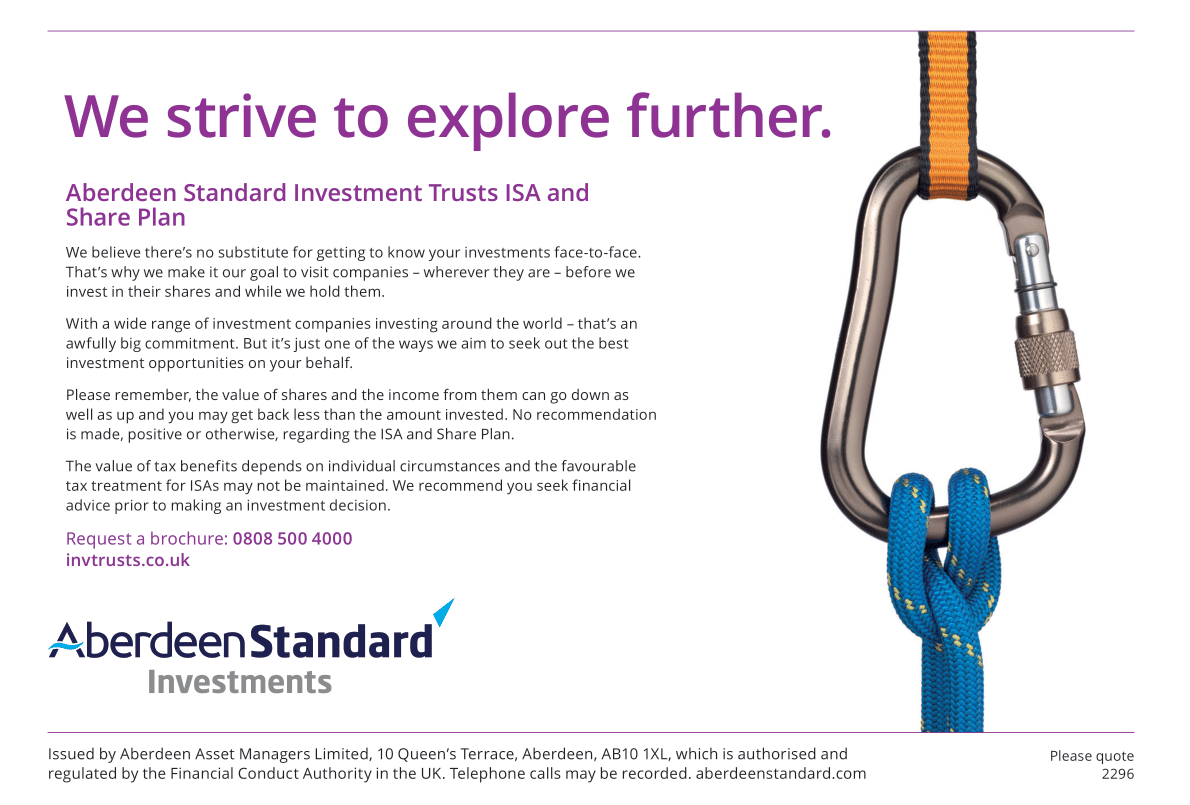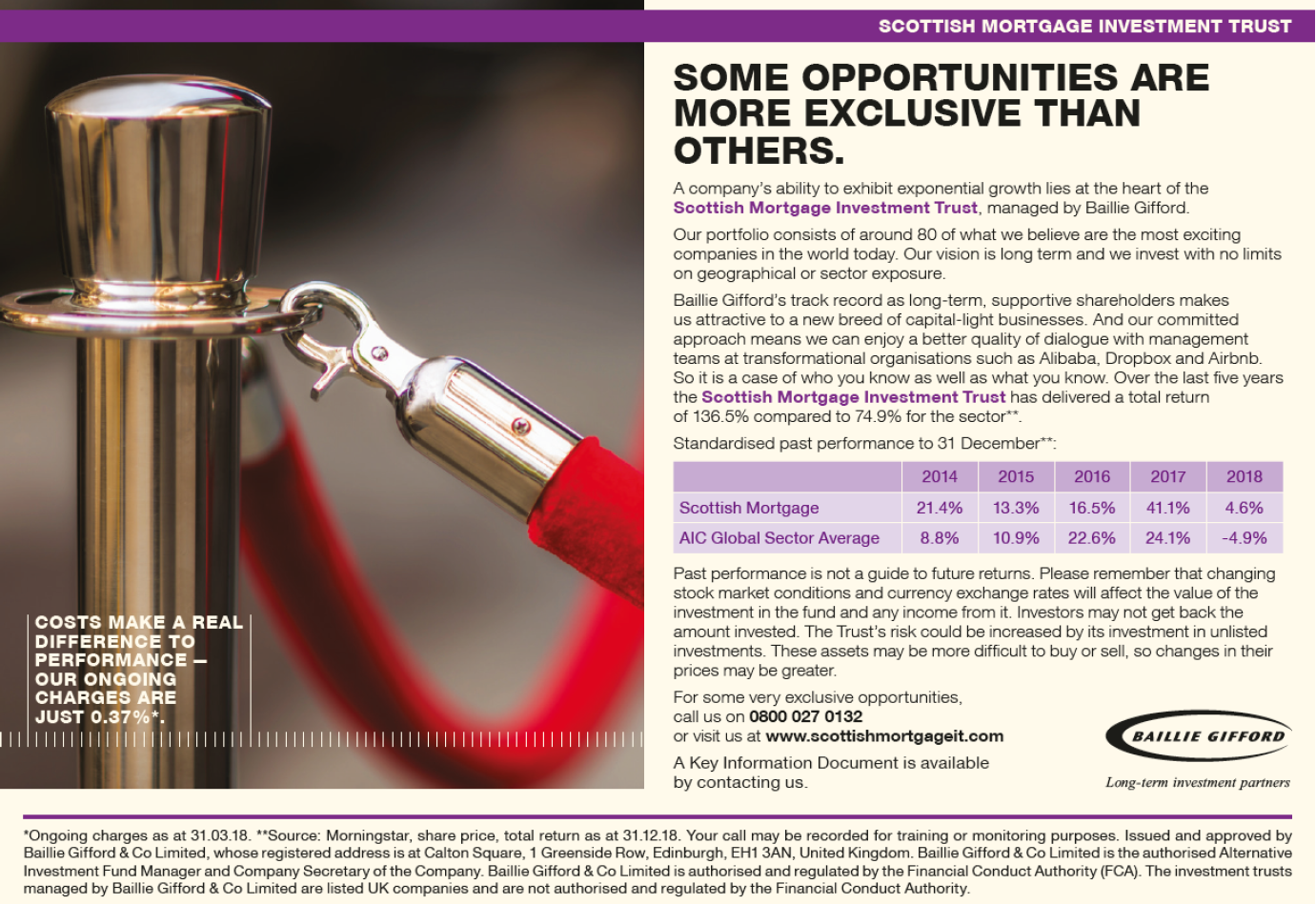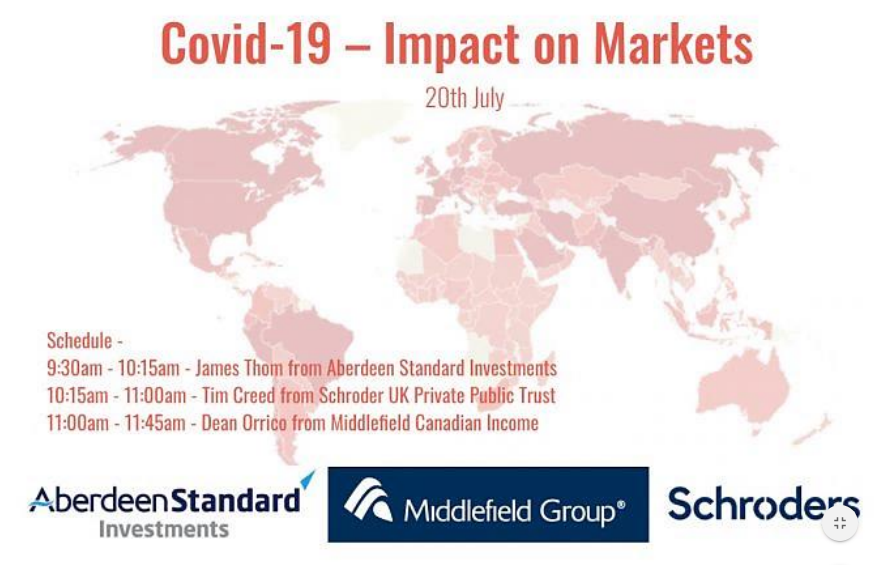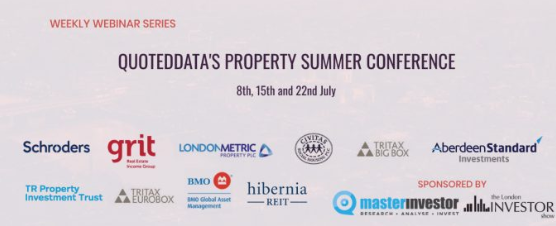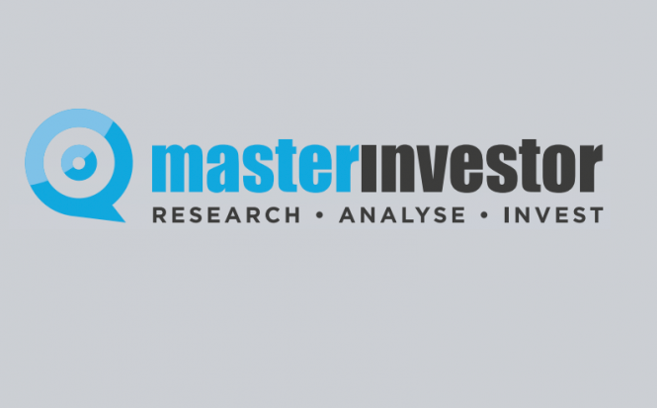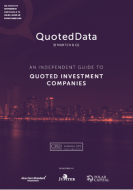Investment Companies Quarterly Roundup
Kindly sponsored by Baillie Gifford and Aberdeen Standard Investments
 Table of contents
Table of contents
- In this issue
- Performance data
- Discounts and premiums
- Money in and out
- Major news stories
- Upcoming Events
- New research
- Guide
- The legal bit
 When the going gets tough…
When the going gets tough…
It was a remarkable second quarter with global markets staging the sort of comeback few would have thought plausible, at the end of March. With some countries still battling the first wave of infection and others seemingly headed to a second, not to mention what happens when governments start to remove direct stimulus measures, uncertainty still abounds.
Discounts narrowed sharply over the second quarter, with the rebound in share prices proving as dramatic as the March collapse. At 30 June 2020, the median discount was about 3.5% wider than the level one year ago.
Some sectors, such as biotech and healthcare, are either less affected by, or maybe potential beneficiaries, of Covid-19 and the shift to the new normal. Others, such as commercial property, have been heavily re-priced.
Biotech is proving resilient

For a comprehensive collation of commentary from fund managers and chairman in response to covid-19, you can access our most recent economic and political roundup here.
 In this issue
In this issue
Performance Data – Technology-focused strategies performed well right through the quarter. Commodity funds staged a comeback while Asia-Pacific funds performed very well
Money in and out – Perpetual Income and Growth served notice to Invesco and Mark Barnett and India Capital Growth received the backing it needed for continuation. We have updates and responses from a raft of funds across the investment trust industry. Click here to access the news section
Major news stories – Scottish Mortgage’s soaring NAV has been attracting a plethora of new investors, while in April Supermarket Income REIT raised a remarkable £139.9m (it was targeting £75m)
 Performance data
Performance data
Out of a total of 329 investment companies (we excluded funds with market caps below £15m), second quarter median total NAV and market returns amounted to 13.4% and 18.8% (the equivalent first quarter figures were -13.1% and -23.3%). It was an extraordinary quarter, not least because most forecasters still expect the pandemic to inflict the worst global recession since the great depression of the late 1920s.
The commodities sector staged a comeback, with several funds exposed to oil, benefitting from the rise in prices. Gold’s revival continued apace too. We saw a continuation in the dash to technology, which in addition to pure technology strategies, has been manifesting mainly in the global and Asia-focused sectors. Equity income strategies (and parts of the debt sector) struggled, as companies across Europe and the North America reduced or stopped distributions. North American equity funds performed very well, with the Fed determined to pull out all the stops. Other regional trends included the strength of the Asia-Pacific region, with the likes of China, Japan, Vietnam, and South Korea, well ahead of the rest of the world on the path back to pre-pandemic normality.
There is still little to cheer about for the leasing, commercial property, and structured debt sectors (structured debt holds riskier debt tranches than loan funds). Out of the 20 worst price performers over the second quarter, 11 were property funds.
Gold has been shining

 Positive movers
Positive movers
The price of Brent Crude oil increased by more than 60% over the second quarter, which was very good news for the two Riverstone funds (Riverstone Energy and Riverstone Credit Opportunities Income). BlackRock World Mining and CQS Natural Resources Growth and Income also benefited from this and a broader recovery in commodities more generally. Golden Prospect Precious Metals’ performance reflects the surging popularity of gold as a hedge. In both price and NAV terms, the trust has been the best performing investment company, over the first half of the year (YTD). The trust was also the best performing investment company in 2019 in both price (+77.5%) and NAV terms (+65.3%). In NAV terms, both Baillie Gifford US Growth and Scottish Mortgage had stellar quarters, benefitting from the managers expertise in the technology and unlisted spaces. Scottish Mortgages’ soaring NAV has also allowed it to attract considerable new investment (see the ‘money in and out’ section).
The resilience of technology reflects the widespread belief that the pandemic has brought forward the adoption timeframe of many ‘disruptive technologies’ significantly. This feeds right into the hands of the fintech sector (notwithstanding the ongoing Wirecard scandal), which saw flows into Augmentum Fintech shoot-up. One of Augmentum’s holdings, Onfido (it focuses on identity verification and authentication), raised $100m over April. Pacific Horizon, another Baillie Gifford managed fund, had a particularly good quarter. It benefitted from its considerable exposure to China and South Korea, which together account for more than half its assets, and holdings in a number of newer breed Asian technology companies. Weiss Korea Opportunity’s push came over June, as flows into export-oriented South Korea picked up. Most of Miton UK Microcap’s performance came over April. Despite a 67% price return over the quarter, it is still down YTD. Geoff Hsu, manager of Biotech Growth, says the sector is currently in a “golden age” of innovation. The fund led performance in what was another strong quarter for the biotech and healthcare sector. India Capital Growth’s shares surged in the leadup to a continuation vote, which it passed comfortably (you can access our May note on the fund by clicking here).
 Negative movers
Negative movers
US-focused Marble Point Loan Financing was the worst performing company in share price terms during the quarter – it is heavily exposed to the CLO market, which has been handicapped by a series of credit ratings downgrades on the underlying loan collateral. Fair Oaks Income 2017 was similarly affected. These funds tend to invest in instruments that bear the first losses but get paid high rates of interest. The structured debt sector did stage a bit of a rally over June though, on the back of perceived value as sentiment improved. The leasing sector continued to suffer over the second quarter.
It has been the worst hit sector by far, so far this year, in price terms, shedding half its value (see ‘Appendix 1’ in the enclosed PDF). DP Aircraft 1, which was forced to take equity in Norwegian, in place of its leases, has been hit the hardest. Commercial property funds felt the full force of the lockdown, as office and retail footfall ground to a halt. Standard Life Investments Property Income, UK Commercial Property REIT, and BMO Real Estate have been heavily affected as a result. Riverstone Energy’s NAV is down by considerably more than its shares YTD. Investors are trying to compute the extent to which the pandemic will damage the performance of the private equity sector. The environment for distributions, previously strong, will inevitably suffer, although the resilience of public markets should provide some cushion to the NAV impact on private equity, based on the use of market comparables to value unlisted companies. The two private equity funds in the table above struggled for more idiosyncratic reasons. Electra Private Equity has two main investments. These include the casual dining chain, TGI Fridays, which was shut over the quarter. Asia-focused Symphony International was doubly-hit by its large exposure to the Thai hospitality company Minor International, and weakness in the baht currency. JZ Capital Partners announced that it would be making no new investments and that a great deal of the existing portfolio will need to be sold to meet debt repayments. In April, the financials-sector fund, EJF, posted its worst monthly return since launch. It also took off its currency hedging.
 Discounts and premiums
Discounts and premiums
Interestingly, across all 329 investment companies, the median level of discount, at the quarter-end, only narrowed by 1.4%, from 31 March. A number of sectors remain under pressure and in the case of many alternative asset sectors, the more periodic reporting of NAV means that the true impact of the pandemic, to-date, will become clearer over the third quarter.
 Getting more expensive
Getting more expensive
We discussed Riverstone Energy, Riverstone Credit Opportunities Income, and Augmentum Fintech in the ‘winners and losers’ section. Crystal Amber was the best performer over June in share price terms after an investigation by the UK’s Serious Fraud Office, into De La Rue, one of the fund’s largest holdings, ended. Growth Capital-sector fund, Merian Chrysalis, holds a number of tech-focused ‘disrupters.’ Syncona’s shares climbed sharply higher in the last week of June, after one of its holdings, Freeline, raised additional capital at a higher valuation. The Brevan Howard hedge fund, BH Macro USD, had a strong quarter.
| wdt_ID | Fund | 30/06/2020 (%) | 31/03/2020 (%) |
|---|---|---|---|
| 1 | Riverstone Energy | -12.80 | -66.00 |
| 2 | Augmentum Fintech | -5.50 | -43.40 |
| 3 | Riverstone Credit Opportunities Income | -26.70 | -60.10 |
| 4 | Crystal Amber | -1.90 | -31.40 |
| 5 | Merian Chrysalis | 5.40 | -19.00 |
| 6 | Blackstone/GSO Loan Financing | -13.60 | -36.70 |
| 7 | Tritax Big Box | -1.90 | -24.90 |
| 8 | JPMorgan Global Core Real Assets | 11.70 | -10.10 |
| 9 | Syncona | 32.50 | 11.80 |
| 10 | BH Macro USD | 16.60 | -3.80 |
The hedge fund sector has benefited from the extreme volatility seen this year. JPMorgan Global Core Real Assets real asset-focus is proving resilient, with sectors such as infrastructure capable of maintaining income generation. Tritax Big Box had a good quarter, with the logistics sector faring far better than wider real estate. The advent of the pandemic has accelerated the trend towards online shopping, with Amazon seeing a spike in demand for its services. Tritax Big Box signed a pre-let deal with Amazon in June, in what was seen as a coup for the fund.
 Getting cheaper
Getting cheaper
Marble Point Loan Financing, Standard Life Investments Property Income, UK Commercial Property REIT, and EJF were discussed in the ‘winners and losers’ section. Schroder Real Estate has been hit by the same dynamics that have impinged on aforementioned UK property companies. During March, the gearing built in to split capital trusts, like Acorn Income, magnified the declines in NAV. However, over the second quarter, Acorn Income’s discount widened as its NAV rebounded strongly but its share price failed to keep pace.
| wdt_ID | Fund | 30/06/2020 (%) | 31/03/2020 (%) |
|---|---|---|---|
| 1 | Marble Point Loan Financing | -8.70 | 99.60 |
| 2 | EJF | -27.30 | 2.50 |
| 3 | Standard Life Inv. Property Income | -26.90 | 0.60 |
| 4 | Drum Income Plus REIT | -36.90 | -12.30 |
| 5 | Trian Investors 1 | -21.80 | -0.60 |
| 6 | RDL Realisation | -55.40 | -37.90 |
| 7 | UK Commercial Property REIT | -30.30 | -13.10 |
| 8 | Acorn Income | -17.90 | -2.50 |
| 9 | Schroder Real Estate | -49.30 | -34.90 |
| 10 | Globalworth Real Estate | -31.40 | -18.30 |
 Money in and out
Money in and out
Around £330m of new capital was raised over the second quarter, with five funds raising more than £100m.
 Money coming in
Money coming in
Scottish Mortgage’s soaring NAV has been attracting a plethora of new investors. Supermarket Income REIT raised £139.9m in April, a remarkable figure in the current climate given that the original target was £75m. Such a heavy oversubscription demonstrated investors’ need for certainty of income. Supermarkets are having fewer problems meeting rent obligations.
Supermarket REIT raised nearly £140m in April
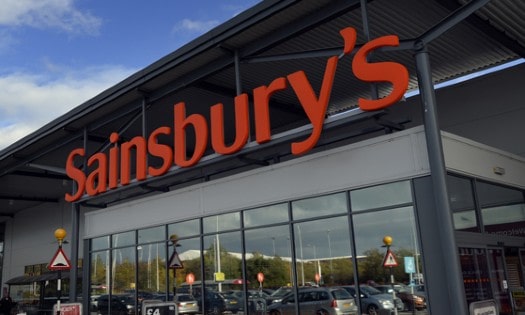
Renewables Infrastructure Group’s share issue raised £120m, in what was another show of confidence towards renewables and the relative certainty of income the sector provides. Worldwide Healthcare raised £70.9m over May, through a series of issuances, with its diversified healthcare strategy (by sub-sector and geography) proving popular a time where the sector is very much in favour. The most recent major placing came in June, with SDCL Energy Efficiency Income raising £110m – It had been looking for £60m.
 Money going out
Money going out
Pershing Square has been buying back stock as part of its commitment to narrow its discount. Polar Capital Global Financials had offered all its investors a chance to exit the trust at NAV. Over April, shareholders voted to extend its life indefinitely and the trust still has 123m shares in issue.
 Major news stories
Major news stories
Portfolio developments:
- HarbourVest Global Private Equity discussed the PE market
- Fidelity China has been shrugging of the virus
- Hipgnosis Songs said its NAV increased 17.7% in an update head of its annual results
- Aberdeen Japan said the pandemic’s impact had been less severe in the country
- JLEN set out its plans for the future
- NextEnergy was hit by falling power prices
- Lindsell Train outperformed, again
- We also had results (interim) and an update from VietNam Holding
- Schiehallion reported inaugural annual results
- SQN Asset Finance discussed its future plans
- Standard Life Private Equity took a modest hit to its NAV in March
- Schroder AsiaPacific said in May that it sees anti-globalisation tide drawing strength from the pandemic
- Scottish Mortgage continued to provide an effective shelter, over the second quarter
- Polar Capital Global Financials said in May that it would maintain an equivalent level dividend this year
- Over April, QuotedData spoke to SV Health Partners, managers of International Biotechnology’s unquoted investments, about Covid-19
- HICL Infrastructure completed investments worth £103m
- Fintech company Augmentum said two portfolio companies had closed fundraisings worth a combined $111m
- We had final results and a gold outlook from Golden Prospect Precious Metals
- Vietnam Enterprise said the country was coming off its best economic growth year in a decade
- US Solar said there had been no material impact on its construction timeline or operating cashflows
- Greencoat UK Wind struck a £320m subsidy-free deal
Corporate news:
- JPMorgan Multi Asset announced it would be maintaining its dividend
- SDCL Energy Efficiency is set for expansion after a successful year
- India Capital Growth received the backing it needed for continuation
- Polar Capital Global Financial’s life was extended indefinitely following a shareholder vote
- Ecofin grew over the quarter
- Gabelli Value Plus+’s directors advised shareholders to vote against continuation
- JPMorgan Multi Asset announced it would be maintaining its dividend
- Polar Capital Technology’s managers reflected on the evolvement of video games: from niche pastime to mainstream entertainment
- JZ Capital said it would not be making new investments
Managers and fees:
- Temple Bar served protective notice to manager Ninety One UK
- Perpetual Income and Growth served notice to Invesco and Mark Barnett
- There was a management reshuffle at SQN Asset Finance
- There was a manager change at JPMorgan Indian
- Strategic Equity Capital announced a manager change
- Aberdeen New Thai’s board got tough after poor year
Property news:
- Intu, the biggest shopping centre owner in the UK, went into administration
- Civitas Social Housing had a good year. The company collected 99% of rent over the March-end quarter
- In May, Phoenix Spree Deutschland said it had collected 98% of April rent as Germany eases restrictions
- There was an ongoing battle between landlords and Travelodge
- Cuba-focused Ceiba suspended its dividend
- Aberdeen Standard European Logistics Income committed to its quarterly dividend
 Events
Events
- Dunedin Income Growth AGM 2020, 16 July 2020
- Foresight Solar Fund AGM 2020, 16 July 2020
- Syncona AGM 2020, 28 July 2020
- Montanaro UK Smaller AGM 2020, 31 July 2020
- Aberdeen New Dawn AGM 2020, 2 September 2020
- Polar Capital Technology AGM 2020, 2 September 2020
- UK Investor Show, 26 September 2020
- The London Investor Show, 30 October
- Sustainable & Social Investing Conference, 3 December 2020
Covid-19 – Impact on Markets – 20 July 2020
QuotedData’s property summer conference – 15 and 22 July 2020
Master Investor – the UKs largest private investor show – 5 December 2020
 Guide
Guide
Our Independent Guide to quoted investment companies is an invaluable tool for anyone who wants to brush up on their knowledge of the investment companies’ sector.
 New research
New research
Here is a list of research we published over the second quarter:
Over the quarter, we published notes on Aberdeen Standard European Logistics Income, BlackRock Throgmorton, Civitas Social Housing, CQS Natural Resources Growth and Income, CQS New City High Yield, Ecofin Global Utilities and Infrastructure, GCP Infrastructure, Henderson High Income, Herald, India Capital Growth, International Biotechnology, JLEN Environmental Assets, Polar Capital Technology, Seneca Global Income & Growth, Strategic Equity Capital, North American Income, and Vietnam Holding. You can read all these notes by clicking on the links above.
 The legal bit
The legal bit
This note was prepared by Marten & Co (which is authorised and regulated by the Financial Conduct Authority).
This note is for information purposes only and is not intended to encourage the reader to deal in the security or securities mentioned within it.
Marten & Co is not authorised to give advice to retail clients. The note does not have regard to the specific investment objectives, financial situation and needs of any specific person who may receive it.
This note has been compiled from publicly available information. This note is not directed at any person in any jurisdiction where (by reason of that person’s nationality, residence or otherwise) the publication or availability of this note is prohibited.
Accuracy of Content: Whilst Marten & Co uses reasonable efforts to obtain information from sources which we believe to be reliable and to ensure that the information in this note is up to date and accurate, we make no representation or warranty that the information contained in this note is accurate, reliable or complete. The information contained in this note is provided by Marten & Co for personal use and information purposes generally. You are solely liable for any use you may make of this information. The information is inherently subject to change without notice and may become outdated. You, therefore, should verify any information obtained from this note before you use it.
No Advice: Nothing contained in this note constitutes or should be construed to constitute investment, legal, tax or other advice.
No Representation or Warranty: No representation, warranty or guarantee of any kind, express or implied is given by Marten & Co in respect of any information contained on this note.
Exclusion of Liability: To the fullest extent allowed by law, Marten & Co shall not be liable for any direct or indirect losses, damages, costs or expenses incurred or suffered by you arising out or in connection with the access to, use of or reliance on any information contained on this note. In no circumstance shall Marten & Co and its employees have any liability for consequential or special damages.
Governing Law and Jurisdiction: These terms and conditions and all matters connected with them, are governed by the laws of England and Wales and shall be subject to the exclusive jurisdiction of the English courts. If you access this note from outside the UK, you are responsible for ensuring compliance with any local laws relating to access.
No information contained in this note shall form the basis of, or be relied upon in connection with, any offer or commitment whatsoever in any jurisdiction.
Investment Performance Information: Please remember that past performance is not necessarily a guide to the future and that the value of shares and the income from them can go down as well as up. Exchange rates may also cause the value of underlying overseas investments to go down as well as up. Marten & Co may write on companies that use gearing in a number of forms that can increase volatility and, in some cases, to a complete loss of an investment.

